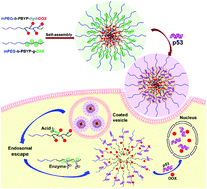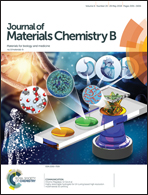A synergistic polyphosphoester-based co-delivery system of the anticancer drug doxorubicin and the tumor suppressor gene p53 for lung cancer therapy†
Abstract
Lung cancer is one of the most frequently occurring cancers worldwide and its pathological complexity necessitates combination therapies of various therapeutic elements such as anti-cancer drugs and genes to achieve synergistic treatment. In this study, we designed a co-delivery carrier of the anti-cancer drug doxorubicin (DOX) and the tumor suppressor gene p53 for lung cancer treatment. First, a copolymer precursor (mPEG-b-PBYP) was prepared via ring-opening polymerization of 2-(but-3-yn-1-yloxy)-2-oxo-1,3,2-dioxaphospholane (BYP). Subsequently, on the basis of the precursor, a pH-sensitive prodrug (abbreviated as mPEG-b-PBYP-hyd-DOX) and a polycation gene vector (abbreviated as mPEG-b-PBYP-g-DAE) were separately prepared via CuAAC and thiol–yne “click” chemistry, wherein DAE represents 2-dimethylaminoethanethiol hydrochloride. After that, the prodrug and the gene vector copolymers were mixed in an aqueous solution in order to self-assemble into hybrid micelles, which could then condense the p53 gene and finally form DOX prodrug/p53 co-loaded nanoparticles. The average particle size and morphologies of the hybrid micelles were measured by dynamic light scattering (DLS) and transmission electron microscopy (TEM), respectively. The gel retardation assay showed that the p53 gene could be well immobilized and maintained stably under the electronegative conditions, similar to those in the blood circulation. A cytotoxicity assay showed the obvious antitumor effect of the hybrid micelle/p53 gene nanoparticles on A549 and H1299 cells when compared to drug or gene therapy applied alone, respectively. Furthermore, the results from the live cell imaging system revealed that the hybrid micelle/p53 gene nanoparticles could effectively deliver and release DOX and the p53 genes into A549 cells. All of the results showed that the hybrid micelles containing the DOX prodrug and p53 genes could be widely used in the treatment of lung cancer.



 Please wait while we load your content...
Please wait while we load your content...